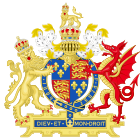Mary Seymour | |
|---|---|
| Born | 30 August 1548 Sudeley Castle, Gloucestershire, England |
| Died | ? |
| Noble family | Seymour |
| Father | Thomas Seymour, 1st Baron Seymour of Sudeley |
| Mother | Catherine Parr |
Mary Seymour (30 August 1548 – ?), born at her father’s country seat, Sudeley Castle in Gloucestershire, was the only daughter of Thomas Seymour, 1st Baron Seymour of Sudeley (brother of Jane Seymour, third wife of Henry VIII), and the dowager queen, Catherine Parr, widow of Henry VIII. Although Catherine was married four times, Mary was her only child. Complications from Mary's birth would claim the life of her mother on 5 September 1548, and her father was executed less than a year later for treason against her cousin Edward VI.
| Restitution of Mary Seymour Act 1549 | |
|---|---|
| Act of Parliament | |
 | |
| Long title | An Act of the Restitution of Mary Seymour dawghter of the Lorde Seymour late Admirall of Englond. |
| Citation | 3 & 4 Edw. 6. c. 14 |
| Dates | |
| Royal assent | 1 February 1550 |
| Commencement | 4 November 1549 |
| Repealed | 16 June 1977 |
| Other legislation | |
| Repealed by | Statute Law (Repeals) Act 1977 |
Status: Repealed | |
| Text of statute as originally enacted | |
In 1549, the Parliament of England passed an act (3 & 4 Edw. 6. c. 14) removing the attainder placed on her father from Mary, but his lands remained property of the Crown.
As her mother's wealth was left entirely to her father and later confiscated by the Crown, Mary was left a destitute orphan in the care of Katherine Willoughby, Duchess of Suffolk, who appears to have resented this imposition.[1] After her second birthday in 1550, Mary disappears from historical record completely, and no claim was ever made on her father's meagre estate, leading to the conclusion that she did not live past the age of two.[2]
- ^ Linda Porter (2010) Katherine the Queen
- ^ "Catherine Parr: Children". The Six Wives of Henry VIII. PBS. Retrieved 11 October 2008.